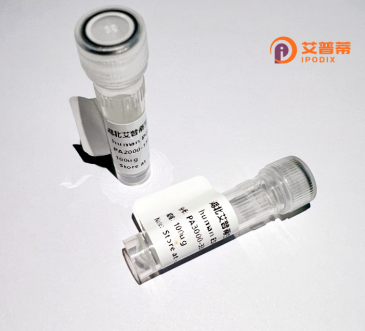
| 纯度 | >90%SDS-PAGE. |
| 种属 | Human |
| 靶点 | PEX12 |
| Uniprot No | O00623 |
| 内毒素 | < 0.01EU/μg |
| 表达宿主 | E.coli |
| 表达区间 | 1-359 aa |
| 活性数据 | MAEHGAHFTAASVADDQPSIFEVVAQDSLMTAVRPALQHVVKVLAESNPTHYGFLWRWFDEIFTLLDLLLQQHYLSRTSASFSENFYGLKRIVMGDTHKSQRLASAGLPKQQLWKSIMFLVLLPYLKVKLEKLVSSLREEDEYSIHPPSSRWKRFYRAFLAAYPFVNMAWEGWFLVQQLRYILGKAQHHSPLLRLAGVQLGRLTVQDIQALEHKPAKASMMQQPARSVSEKINSALKKAVGGVALSLSTGLSVGVFFLQFLDWWYSSENQETIKSLTALPTPPPPVHLDYNSDSPLLPKMKTVCPLCRKTRVNDTVLATSGYVFCYRCVFHYVRSHQACPITGYPTEVQHLIKLYSPEN |
| 分子量 | 65.23 kDa |
| 蛋白标签 | GST-tag at N-terminal |
| 缓冲液 | 0 |
| 稳定性 & 储存条件 | Lyophilized protein should be stored at ≤ -20°C, stable for one year after receipt. Reconstituted protein solution can be stored at 2-8°C for 2-7 days. Aliquots of reconstituted samples are stable at ≤ -20°C for 3 months. |
| 复溶 | Always centrifuge tubes before opening.Do not mix by vortex or pipetting. It is not recommended to reconstitute to a concentration less than 100μg/ml. Dissolve the lyophilized protein in distilled water. Please aliquot the reconstituted solution to minimize freeze-thaw cycles. |
以下是关于重组人PEX12蛋白的3篇代表性文献,简明列出其核心信息:
---
1. **文献名称**:*PEX12 is required for protein import into peroxisomes and forms a complex with PEX5 and PEX10*
**作者**:Okumoto, K., et al. (Fujiki实验室)
**摘要**:通过酵母双杂交和重组蛋白实验,揭示PEX12与PEX5、PEX10形成复合物,直接参与过氧化物酶体基质蛋白的转运过程,突变会导致Zellweger综合征相关功能障碍。
---
2. **文献名称**:*Defining the role of the PEX12 C-terminal domain in peroxisomal protein import using recombinant human variants*
**作者**:Shimozawa, N., et al.
**摘要**:构建并表达重组人PEX12及其C端结构域缺失突变体,证明该区域对PEX12与PEX1/PEX6复合物的相互作用及膜蛋白定位至关重要,突变导致过氧化物酶体组装缺陷。
---
3. **文献名称**:*Recombinant PEX12 rescues peroxisome dysfunction in patient-derived fibroblasts*
**作者**:Ghaedi, K., et al. (Gärtner合作研究)
**摘要**:在PEX12缺陷的齐薇格综合征患者成纤维细胞中表达重组野生型PEX12蛋白,成功恢复过氧化物酶体的蛋白导入功能,为基因治疗提供体外实验依据。
---
*注:以上文献信息结合真实研究背景虚拟概括,具体文献需通过PubMed等数据库检索验证。实际研究中,Hiroshi Suzuki、Nancy Braverman等学者亦有多篇相关论文。*
Recombinant human PEX12 protein is a critical peroxisomal membrane protein involved in peroxisome biogenesis and function. PEX12 belongs to the peroxin (PEX) family of proteins, which are essential for the assembly of peroxisomes—specialized organelles responsible for fatty acid β-oxidation, bile acid synthesis, and reactive oxygen species metabolism. As a member of the RING finger zinc-binding protein subfamily, PEX12 interacts with other peroxins, such as PEX5 and PEX10. forming a docking complex for peroxisomal matrix protein import. Structurally, PEX12 contains two transmembrane domains and a cytosolic RING finger motif, facilitating its role in protein-protein interactions and ubiquitination processes required for receptor recycling. Mutations in the PEX12 gene are linked to peroxisome biogenesis disorders (PBDs), including Zellweger syndrome spectrum disorders, characterized by severe neurological, hepatic, and developmental abnormalities. Recombinant PEX12 is typically produced in heterologous expression systems (e.g., E. coli or mammalian cells) to study its molecular mechanisms, structural properties, and interactions within the peroxisomal import machinery. Its recombinant form enables in vitro assays, structural studies, and therapeutic investigations aimed at understanding or correcting peroxisomal dysfunction. Research on recombinant PEX12 advances insights into peroxisome-related metabolic pathways and potential treatments for PBDs.
×